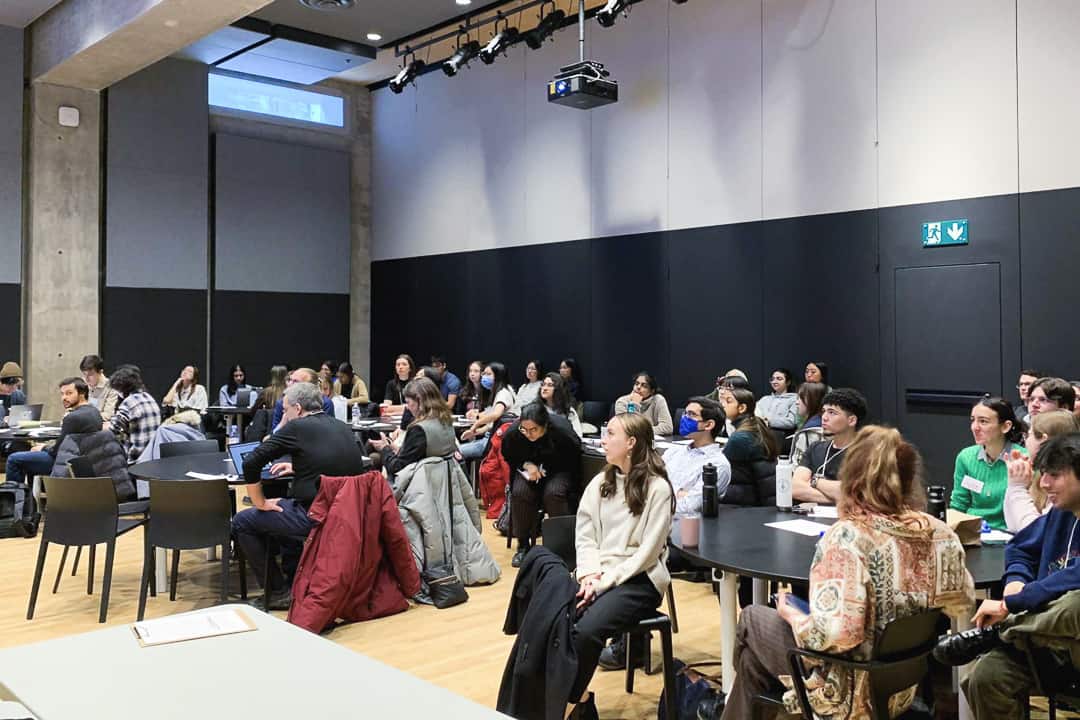The Neuroscience Association of Undergraduate Students (NAUS) hosted their 10th Annual Everything Neuroscience Conference on January 14. This year’s theme was neuropharmacology.
Almira Siddiqui, NAUS’ vice president of academic affairs, wrote in an email to The Varsity, “This event was NAUS’s first in-person conference since the COVID-19 pandemic, and I think its success just got the team more excited for future in-person events.”
The event started off with a talk from Patricia Diciano, an assistant professor in the Department of Pharmacology and an Independent Scientist at The Centre for Addiction and Mental Health (CAMH). She spoke on cannabis and its tetrahydrocannabinol (THC) content, and how the potency relates to impairment during driving. It was shocking to learn that 23 per cent of people who used cannabis in 2022 admit to driving within two hours of use. She also expressed the need for more studies that examine cannabis with THC potencies currently available on the market.
Alzheimer’s disease and research surrounding it was the focus of the talk by Krista Lanctot, Sunnybrook’s director of neuropsychopharmacology and a professor of psychiatry and pharmacology at U of T. Despite the fact that many participants receive placebos during clinical trials, Lanctot said that patients generally still show improvements due to the support and other care they receive besides drug administration.
John Oldenhof is executive vice president of scientific affairs at BioPharma Services. He talked about the shift from treating patients with developmental epileptic encephalopathy — epilepsies that are characterized by seizures and significant developmental delay — based on their genetics and not solely based on symptoms. Through this shift, there have been developments of new animal and cellular models of the disease on which we can test new therapeutic approaches and identify the genetic and basic molecular causes. They have also seen a quicker time between a patient undergoing their first seizure and their diagnoses.
As a parent advocate for drug development for his son’s monogenetic developmental epileptic encephalopathy, Oldenhof stressed the importance of an “inchstone” versus a milestone — celebrating small accomplishments on the patient’s journey. He used the example of someone who is non-verbal acquiring the capability to speak ten words, and the positive impact that this development could have on the patient’s — as well as their caregiver’s — lifestyle.
Following that, Ali Salahpour, the interim chair in the Department of Pharmacology and Toxicology, spoke about the dopaminergic system and misfolded proteins. During the question and answer period, he shared his insights on the limitations surrounding preclinical animal models. When a large percentage of dopamine transporters are knocked out in mice, those mice tend to continue normally with no major deficiencies. Humans, on the other hand, will undergo deficiencies in their motor skills if dopamine transporters are knocked out. This is an important consideration to make when applying research done on mouse models to humans.
Benjamin Goldstein is a clinical scientist and the director of the Centre for Youth Bipolar Disorder at CAMH, as well as a professor of psychiatry and pharmacology. Exploring the area of major depressive disorder and bipolar disorder, Goldstein spoke on how individuals experiencing these issues are at an increased risk for heart disorders. He explained that individuals with bipolar disorder in particular have a particular phenotype that affects the function of arteries that increases their risk.
The next talk covered the comorbidity between post-traumatic stress disorder (PTSD) and substance use disorders. It was led by Dr. Ahmed Hassan, an addiction psychiatrist and clinician scientist at CAMH and an assistant professor in the Department of Psychiatry and the Department of Pharmacology and Toxicology. Hassan explained that this comorbidity can occur due to a number of reasons — including that individuals with PTSD could turn to substance use for self-medication or that individuals with substance use disorder may develop PTSD as a result. He emphasized the importance of biopsychosocial approaches when it comes to developing treatments as well as prevention plans.
Dr. Martin Beaulieu holds the Canada Research Chair in Molecular Psychiatry at the Department of Pharmacology and Toxicology at U of T. He spoke about the connection between cellular mechanisms in drug response and genetics, and about the notion of allostatic load. He explained how there is an optimum level of stress that is most helpful for performance; however, being under or over this level of stress can either lead to low morale or burnout.
It was incredible to learn about all of the emerging discoveries in the field of neuropharmacology, as well as gain insights from the researchers that can be applicable to a variety of fields. It is highly recommended that you attend conferences at The University of Toronto, especially since they are now in-person, for a great opportunity to further your learning, network with professionals, and meet your peers!


